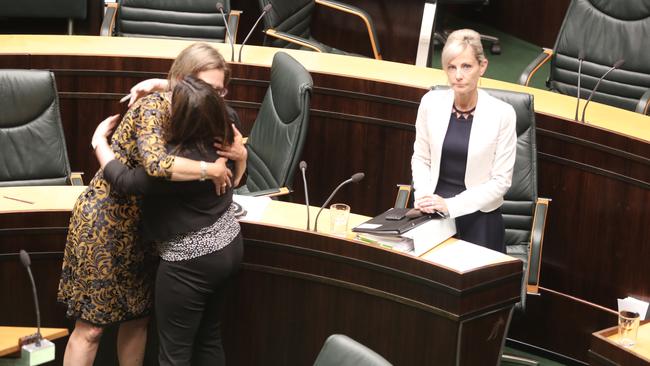Tasmania’s lower house passes the nation’s most sweeping transgender rights laws
Scott Morrison blasts new Tasmanian laws removing gender for birth certificates and calls on Bill Shorten to commit to “outlaw’ such practises.

Scott Morrison has blasted new Tasmanian laws removing gender for birth certificates and has called on Bill Shorten to commit to “outlaw’ such practises.
Amendments making gender an opt-in option on birth certificates passed Tasmania’s lower house yesterday with the support of Labor, the Greens and Liberal speaker Sue Hickey.
The Prime Minister took to Twitter this morning to criticise the move and said Mr Shorten should bring the matter up at next month’s ALP national conference in Adelaide.
“Labor’s plan to remove gender from birth certificates in Tasmania is ridiculous. Bill Shorten should step up and commit to put motion to ALP Federal Conference to outlaw it,” he tweeted.
Labor’s plan to remove gender from birth certificates in Tasmania is ridiculous. Bill Shorten should step up and commit to put motion to ALP Federal Conference to outlaw it.
— Scott Morrison (@ScottMorrisonMP) November 20, 2018
The Tasmanian changes also allow people as young as 16 to change their official gender simply by filing a statutory declaration.
The House of Assembly also passed a broadening of Tasmania’s anti-discrimination laws to extend hate speech to cover “gender expression”, including correct use of transgender people’s changed honorifics and names.
Mr Shorten has already denied that changes to the ALP national platform at the conference would call to remove gender from important identification documents such as birth certificates and licenses.
“No, no … it’s nonsense, no plans to do that,” Mr Shorten told reporters in Melbourne on October 31.
“The relative number of people who are trans is about 1200 people in Australia. That’s about one in every 200,000. That’s important for them but I just wonder why conservatives get so obsessed by other people’s sexuality.
“We’ve got no plans to change that (gender on documents).”
The Daily Telegraph has reported a leaked final draft of Labor’s national policy platform embraces the “Yogyakarta Principles on the Application of International Human Rights Law in relation to sexual orientation, gender identity, gender expression and sex characteristics”.
Those principles were updated last year to advocate removing gender from identification documents. But Mr Shorten said today his government would keep the gender status quo.
Gender record now opt-in
Tasmania’s changes, put forward by Labor and the Greens and passed with the casting vote of turncoat Liberal Speaker Sue Hickey, also allow people as young as 16 to change their official gender simply by filing a statutory declaration.
As well, the House of Assembly passed a broadening of Tasmania’s anti-discrimination laws to extend hate speech to cover “gender expression”, including correct use of transgender people’s changed honorifics and names.
While the amendments still need to pass the state’s independent-dominated upper house, the parliamentary coup is a major win for transgender rights nationally. It is also a significant blow for the Hodgman Liberal government and its claim to stable government, given Ms Hickey used her casting vote against her party on all key amendments.

Veteran LGBTI campaigner Rodney Croome last night hailed the outcome, which will embolden activists seeking similar changes across the country.
“It’s appropriate that, on the first anniversary of the postal survey, the principle of equality that Tasmanians voted for so emphatically is being put into practice for our transgender and gender-diverse fellow citizens,” Mr Croome said.
Transforming Tasmania spokesperson Roen Meijers said the changes provided “greater equity, dignity and hope for transgender, gender-diverse and intersex Tasmanians”.
“We will now turn our attention to the upper house which we will brief on Thursday,” Mr Meijers said.
A broad range of interests, from radical feminists to conservative Christians, attacked the reforms as effectively abolishing gender and threatening the safety of female-only services, from domestic violence shelters to the Girl Guides.

Ms Hickey sided with the opposition parties despite Liberal Attorney-General Elise Archer warning that the amendments — to a government bill removing the need for people to divorce in order to change gender — were confusing, untested, poorly drafted and liable to lead to unintended consequences.
“The government prefers to refer this to the Tasmanian Law Reform Institute … because there are significant drafting flaws and legal consequences — things that need to be considered,” Ms Archer told parliament.
Labor legal affairs spokeswoman Ella Haddad said changes requiring parents to apply to the Registrar of Births, Deaths and Marriages if they wanted their child’s sex recorded on a birth certificate were not radical.
Ms Haddad said a form would simply ask parents of newborns “Do you wish to have gender printed on the birth certificate”. “It creates an opt-in approach,” Ms Haddad said.
Ms Archer and the government refused to back any of the amendments.




To join the conversation, please log in. Don't have an account? Register
Join the conversation, you are commenting as Logout